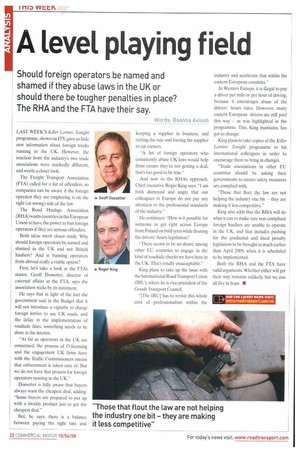I A level playing field
Page 22

If you've noticed an error in this article please click here to report it so we can fix it.
vvttrk
Should foreign operators be named and shamed if they abuse laws in the UK or should there be tougher penalties in place? The RHA and the FTA have their say.
Words: Roanna Avison LAST WEEK'S Killer Lorries: Tonight programme, shown on ITV, gave us little new information about foreign trucks running in the UK. However, the reaction from the industry's two trade associations were markedly different, and worth a closer look.
The Freight Transport Association (FTA) called for a list of offenders, so companies can be aware if the foreign operator they are employing is on the A Geoff Dossetter right (or wrong) side of the law.
The Road Haulage Association (RHA) wants countries in the European Union to have the power to ban foreign operators if they are serious offenders.
Both ideas merit closer study. Why should foreign operators be named and shamed in the UK and not British hauliers? And is banning operators from abroad really a viable option?
First, let's take a look at the FTMs stance. Geoff Dossetter, director of external affairs at the FTA, says the association sticks by its statement.
He says that in light of the fact the government said in the Budget that it will not introduce a vignette to charge foreign lorries to use UK roads, and the delay in the implementation of roadside fines, something needs to be done in the interim.
-As far as operators in the UK are concerned, the process of 0-licensing and the engagement UK firms have with the Traffic Commissioners means that enforcement is taken care of. But we do not have that process for foreign operators running in the UK."
Dossetter is fully aware that buyers always want the cheapest deal, adding: -Some buyers are prepared to put up with a shoddy product just to get the cheapest deal."
But, he says, there is a balance between paying the right rate and keeping a supplier in business, and cutting the rate and forcing the supplier to cut corners.
-A list of foreign operators who consistently abuse UK laws would help firms ensure they're not getting a deal, that too good to be true."
And now to the RHA's approach. Chief executive Roger King says: "I am both dismayed and angry that our colleagues in Europe do not pay any attention to the professional standards of the industry."
He continues: -How is it possible for someone to get right across Europe from Poland on bald tyres while flouting the drivers' hours legislation?
"There seems to be no desire among other EU countries to engage in the kind of roadside checks we have here in the UK. That's totally unacceptable."
King plans to take up the issue with the International Road Transport Union (IRU), where he is vice-president of the Goods Transport Council.
"[The IRU] has to revisit this whole area of professionalism within the industry and accelerate that within the eastern European countries."
In Western Europe, it is illegal to pay a driver per mile or per hour of driving, because it encourages abuse of the drivers' hours rules. However, many eastern European drivers are still paid this way — as was highlighted in the programme. This, King maintains, has got to change.
King plans to take copies of the Killer Lorries: Tonight programme to his international colleagues in order to encourage them to bring in changes.
"Trade associations in other EU countries should be asking their governments to ensure safety measures are complied with.
-Those that flout the law are not helping the industry one bit — they are making it less competitive."
King also adds that the RHA will do what it can to make sure non-compliant foreign hauliers are unable to operate in the UK, and that includes pushing for the graduated and fixed penalty legislation to be brought in much earlier than April 2009, when it is scheduled to be implemented.
Both the RHA and the FTA have valid arguments. Whether either will get their way remains unlikely, but we can all live in hope. •












































































































































































































